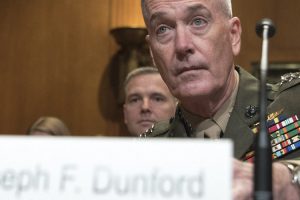Speaking on his April 5 return flight after a three-day day trip to assess progress in Iraq, US Marine Corps General Joe Dunford, Chairman of the Joint Chiefs of Staff said that the battle for Mosul will not be the end of the campaign against Islamic State in Iraq.
“There is a lot of fighting left to go – Hawija, Tal Afar, Euphrates River valley,” he said.
The remarks echo similar statements he made on April 3, when he told reporters that Mosul would not be the end of the US campaign against IS, and that the three major areas of concern after the liberation of Mosul were Tal Afar, Kirkuk and the Euphrates valley near Qaim.
“It is not our judgment that the Iraqis will be self-sustaining and self-sufficient in the wake of Mosul,” Dunford said. “More important, it is not Prime Minister [Haidar] Abadi’s assessment, [either]. He believes he will need continued US support in Iraq post-Mosul.”
Jared Kushner, the senior advisor to President Donald J. Trump, and Tom Bossert, the president’s homeland security advisor, accompanied Dunford for meetings with Iraqi, American and coalition officials.

On March 17, Commander of US Central Command Army General Joseph Votel told the Senate Armed Services Committee that he expected focus to shift to other Iraqi cities after Mosul.
“After Mosul operations are complete, we expect the Government of Iraq to prioritize military operations to recapture Tal Afar, Sinjar, and Hawija, and to secure the border in order to diminish ISIS’ freedom of movement and ability to target major population centers,” he said.
Turkish involvement?
Turkish President Recep Tayyip Erdoğan said on April 4 that the next stages of Operation Euphrates Shield would be broader and include territory in both Iraq and Syria.
Future operations will have “a Syrian dimension, also an Iraqi dimension. There are the Tal Afar and Sinjar situations. We also have kin in Mosul,” Erdoğan said.

